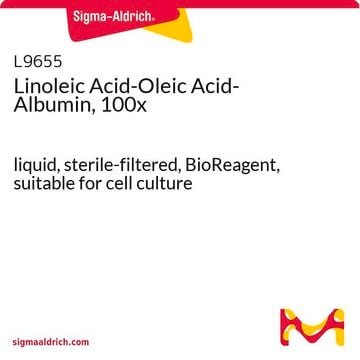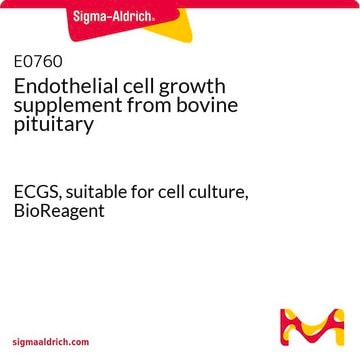L8384
Linoleic Acid-Albumin from bovine serum albumin
γ-irradiated, lyophilized powder, BioReagent, suitable for cell culture
Sign Into View Organizational & Contract Pricing
All Photos(1)
About This Item
UNSPSC Code:
12352202
NACRES:
NA.75
Recommended Products
biological source
bovine plasma
Quality Level
description
Contains 1.1-2.3 moles linoleic acid per mole BSA
sterility
γ-irradiated
product line
BioReagent
form
lyophilized powder
technique(s)
cell culture | mammalian: suitable
impurities
≤50 EU/mg endotoxin
solubility
water: 10 mg/mL, clear to hazy, colorless to light yellow
storage temp.
2-8°C
General description
Linoleic acid is an essential and highly consumed polyunsaturated fatty acid (PUFA). Albumin is a globular protein. Bovine serum albumin (BSA) is composed of a single polypeptide chain and cross-linked cysteine disulfide bridges. BSA is heart-shaped and is made up of three homologous domains I-III and each domain has two subdomains A and B.
Application
Linoleic Acid-Albumin from bovine serum albumin has been used: in cell culture and to study its effects on the human colonic adenocarcinoma cell line. It has also been used in the in vitro culture (IVC) of cow embryos/zygotes. The binding of linoleic acid to BSA improves its stability and solubility in culture media.
Biochem/physiol Actions
Linoleic acid plays a role in maintaining the transdermal water barrier in epidermis. Serum albumin constitutes about 52-62% of the total water-soluble fraction proteins in the blood plasma.
related product
Storage Class Code
11 - Combustible Solids
WGK
WGK 3
Flash Point(F)
Not applicable
Flash Point(C)
Not applicable
Certificates of Analysis (COA)
Search for Certificates of Analysis (COA) by entering the products Lot/Batch Number. Lot and Batch Numbers can be found on a product’s label following the words ‘Lot’ or ‘Batch’.
Already Own This Product?
Find documentation for the products that you have recently purchased in the Document Library.
Customers Also Viewed
Takemasa Hidaka et al.
Theriogenology, 113, 176-182 (2018-03-20)
Variations in embryo production between individual oocyte donors represent a serious problem in cattle production, when implementing ovum pick-up (OPU) and in vitro maturation (IVM) of oocytes. However, the precise cause of this problem is unknown. Here, we aimed to investigate
Our team of scientists has experience in all areas of research including Life Science, Material Science, Chemical Synthesis, Chromatography, Analytical and many others.
Contact Technical Service











